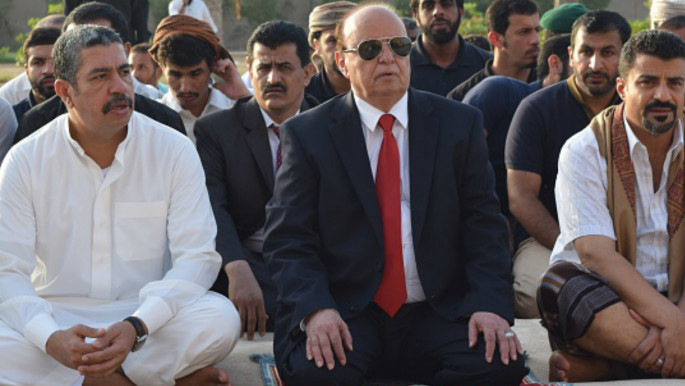Yemen's pro-Saudi president sacks prime minister ahead of negotiations
Bahah's surprise dismissal comes just a week ahead of UN-brokered ceasefire planned between Yemen's warring parties, expected to pave way for peace talks in Kuwait on 18 April.
The decision to replace Bahah was "due to the failures that have accompanied the performance of the government during the past period in the fields of economy, services and security," the Yemeni president said in a statement.
Bahah's government has "failed to ease the suffering of our people, resolve their problems and provide their needs," Hadi added.
The Yemeni president appointed Ahmed bin Dagher, former secretary general of the General People's Congress party to which the president once belonged, as prime minister.
The president also appointed veteran General Ali Mohsen al-Ahmar as vice president.
The surprise move has most likely come after close coordination between Hadi and Riyadh, a source told The New Arab.
 |
| Yemeni president Abedrabbo Mansour Hadi [centre] and Khaled Bahah [left] have had their differences [Getty] |
Iran-backed Shia Houthi rebels have been in control of capital Sanaa since 2014, forcing the government to declare second-city Aden as temporary capital.
But Hadi and many government officials, including Bahah, spend most of their time in Saudi Arabia as they struggle to secure Aden and other parts of the country where Sunni extremists have gained ground.
Adding to the unrest, the local militiamen who fought alongside the government to retake Aden from the rebels last summer have clashed with guards protecting the presidential palace to protest unpaid wages despite Hadi's orders to merge them with the security forces.
Hadi spoke Sunday of a "lack of a proper government administration of the unlimited support from our brothers in the Arab coalition, notably Saudi Arabia" which is leading an alliance against the rebels.
Meanwhile, a shipment of weapons likely heading from Iran to Houthi rebels was seized by US navy on Monday.
The weapons, which included 1,500 Kalashnikov rifles, 200 rocket grenade launchers and 21 calibre machine guns, were confiscated upon interception by the US navy.
Hadi and Bahah's troubled relationship
Government sources have in the past spoken of differences between the president and Bahah, who had served as Yemen's envoy to the UN before Hadi appointed him as foreign minister and then prime minister.
In December, Hadi reshuffled his cabinet, naming new foreign and interior ministers in a move that was understood to be aimed at smoothing his relations with Bahah.
Hadi had also recently been involving the new vice president, Ahmar, more actively in decision-making, appointing him in February as armed forces deputy commander in a bid to rally support from tribes and troops in the rebel-held region around Yemen's capital.
Ahmar's troops played a prominent role in the 2011 uprising that ousted strongman Ali Abdullah Saleh, whose loyalists are now allied with the Shia Houthi rebels in control of Sanaa.
The move aims to "achieve what our people are aspiring for and to restore the state authority, security and stability,” the Yemeni president said.
Around 6,300 people were killed in the war in Yemen since the Saudi-led coalition intervened in March last year, more than half of them civilians, the UN reports.
Agencies contributed to this report.



